国际贸易术语解释通则2010前言(中英对照版)
2010新版国际贸易术语解释通则(中英文版)

国际贸易术语解释通则(2010)法政学院11法61许艳文11036018 目录前言. 1EXW——工厂交货(……指定地点). 5FCA——货交承运人(……指定地点). 7CPT——运费付至(……指定目的港). 10CIP——运费和保险费付至(……指定目的地)13DAT——终点站交货(……指定目的港或目的地)16DAP——目的地交货(……指定目的地). 18DDP——完税后交货(……指定目的地). 20FAS——船边交货(……指定装运港). 22FOB——船上交货(……指定装运港). 24CFR——成本加运费付至(……指定目的港)27CIF——成本,保险加运费付至(……指定目的港)30国际贸易术语解释通则2010全球化经济赋予商业以空前宽广途径通往世界各地市场。
货物得以在更多的国家、大量且种类愈繁地销售。
然而随着全球贸易数额的增加与贸易复杂性的提升,因销售合同不恰当起草引致误解与高代价争端可能性也提高了。
国际贸易术语解释通则这一用于国内与国际贸易事项的国际商会规则使得全球贸易行为更便捷。
在销售合同中参引国际贸易术语解释通则2010可清晰界定各方义务并降低法律纠纷的风险。
自1936年国际商会创制国际贸易术语以来,这项在全球范围内普遍被接受的合同标准经常更新,以保持与国际贸易发展步调一致。
国际贸易术语解释通则2010版考虑到了全球范围内免税区的扩展,商业交往中电子通讯运用的增多,货物运输中安保问题关注度的提高以及运输实践中的许多变化。
国际贸易术语解释通则2010更新并加强了“交货规则”——规则的总数从13降到11,并为每一规则提供了更为简洁和清晰的解释。
国际贸易术语解释通则2010同时也是第一部使得所有解释对买方与卖方呈现中立的贸易解释版本。
国际商会商法和实践委员会成员来自世界各地和所有贸易领域,该委员会宽泛的专业技能确保了国际贸易术语解释通则2010与各地的商贸需要照应。
国际商会向Fabio Bortolotti(意大利)的商法和实践委员会的成员表示谢意,向由Charles Debattista(副组长,英国),Christoph Martin Radtke (副组长,法国),Jens Bredow (德国),Johnny Herre (瑞典),David Lwee(英国),Lauri Railas (芬兰),Frank Reynold(美国),Miroslav Subert (捷克)组成的起草小组致谢,并且向对11条规则的表述给予帮助的Asko Raty (芬兰)致谢。
Incoterms2010国际贸易术语解释通则2010(中文版)

Incoterms2010国际贸易术语解释通则2010(中文版)Incoterms 2010国际贸易术语解释通则2010(中文版)正文:第一章:引言本章介绍了Incoterms 2010的背景和目的,以及其使用范围和适用性。
第二章:术语及定义本章详细解释了与国际贸易术语相关的各种定义和术语。
包括买方和卖方的权利和责任等内容。
第三章:封装和标记本章介绍了在国际贸易中封装和标记的要求。
涵盖了适用于集装箱货物和非集装箱货物的各种规定。
第四章:运输及交付部分的责任和风险转移本章详细说明了不同贸易条件下的买方和卖方之间的责任和风险转移。
包括海上运输、内陆运输和多式联运等情况下的规定。
第五章:保险本章解释了保险在国际贸易中的作用和责任。
包括买方和卖方的保险责任、索赔程序等内容。
第六章:支付本章介绍了国际贸易中的支付方式和相关规定。
涵盖了信用证、托收、现金付款等方面的内容。
第七章:争议解决本章解释了国际贸易争议解决的方式和程序。
包括仲裁、诉讼等各种解决争议的方式。
第八章:附则本章包括了一些与Incoterms 2010相关的特殊规定和说明。
如适用于国内贸易、可转让信用证等。
附件:法律名词及注释:1、仲裁:即通过仲裁机构解决争议的一种方式,由仲裁员根据相关法律和合同约定作出决定。
2、诉讼:即通过法院解决争议的一种方式,由法官根据法律判决争议的结果。
3、集装箱货物:指装运在标准化集装箱中的货物。
4、非集装箱货物:指装运在非标准化集装器中,或者未进行集装的货物。
2010新版国际贸易术语解释通则(中英文版)

国际贸易术语解释通则(2010)法政学院11法61许艳文目录前言. 1EXW——工厂交货(……指定地点). 5FCA——货交承运人(……指定地点). 7CPT——运费付至(……指定目的港). 10CIP——运费和保险费付至(……指定目的地)13DAT——终点站交货(……指定目的港或目的地)16DAP——目的地交货(……指定目的地). 18DDP——完税后交货(……指定目的地). 20FAS——船边交货(……指定装运港). 22FOB——船上交货(……指定装运港). 24CFR——成本加运费付至(……指定目的港)27CIF——成本,保险加运费付至(……指定目的港)30国际贸易术语解释通则2010全球化经济赋予商业以空前宽广途径通往世界各地市场。
货物得以在更多的国家、大量且种类愈繁地销售。
然而随着全球贸易数额的增加与贸易复杂性的提升,因销售合同不恰当起草引致误解与高代价争端可能性也提高了。
国际贸易术语解释通则这一用于国内与国际贸易事项的国际商会规则使得全球贸易行为更便捷。
在销售合同中参引国际贸易术语解释通则2010可清晰界定各方义务并降低法律纠纷的风险。
自1936年国际商会创制国际贸易术语以来,这项在全球范围内普遍被接受的合同标准经常更新,以保持与国际贸易发展步调一致。
国际贸易术语解释通则2010版考虑到了全球范围内免税区的扩展,商业交往中电子通讯运用的增多,货物运输中安保问题关注度的提高以及运输实践中的许多变化。
国际贸易术语解释通则2010更新并加强了“交货规则”——规则的总数从13降到11,并为每一规则提供了更为简洁和清晰的解释。
国际贸易术语解释通则2010同时也是第一部使得所有解释对买方与卖方呈现中立的贸易解释版本。
国际商会商法和实践委员会成员来自世界各地和所有贸易领域,该委员会宽泛的专业技能确保了国际贸易术语解释通则2010与各地的商贸需要照应。
国际商会向Fabio Bortolotti(意大利)的商法和实践委员会的成员表示谢意,向由Charles Debattista(副组长,英国),Christoph Martin Radtke (副组长,法国),Jens Bredow (德国),Johnny Herre (瑞典),David Lwee(英国),Lauri Railas (芬兰),Frank Reynold(美国),Miroslav Subert (捷克)组成的起草小组致谢,并且向对11条规则的表述给予帮助的Asko Raty (芬兰)致谢。
2010国际贸易术语解释通则(中文完整版)

2010年国际贸易术语解释通则(INCOTERMS 2010)目录1. 2010年国际贸易术语解释通则(INCOTERMS 2010)引占EXWFCACPT ClPDAT DAP DDP FAS FOB CFR CIF《2010年国际贸易术语解释通则》中文版INCOTERMS 2010• (2011年1月第二版)引言适用于任何单一运输方式或多种运输方式的术语EXW (EX WOrkS)工厂交货FCA (Free Carner)货交承运人CPT (Carriage Paid TO)运费付至CIP (Carriage and InSUranCe PaiCl to)运费、保险费付至DAT (DeliVereel At TerminaI)运输终端交货DAP (DeliVered At PlaCe) U 的地交货DDP (DeliVered DUty Paiel)完税后交货 适用于海运和内河水运的术语FAS (Free AlOng Side)船边交货 FOB (Free On BOard)船上交货CFR (COSt and Freight)成本加运费1. 2. 3. 4. 5. 6.7. 8.9. 1011CIF (Cost, InSUranCe and Freight)成本、保险加运费EXW(EX WOrkS工厂交货)该术语可适用于任何运输方式,也可适用于多种运输方式。
它适合国内贸易,而FCA-般则更适合国际贸易。
“工厂交货”是指当卖方在其所在地或其它指定地点(如工厂、车间或仓库等)将货物交ill买方处置时,即完成交货。
卖方不需将货物装上任何前来接收货物的运输工具,需要清关时,卖方也无需办理出口清关手续。
特别建议双方在指定交货地范围内尽可能明确具体交货地点,因为在货物到达交货地点之前的所有费用和风险都Ili卖方承担。
买方则需承担自此指定交货地的约定地点(如有的话)收取货物所产生的全部费用和风险。
EXW (工厂交货)术语代表卖方最低义务,使用时需注意以下问题:a)卖方对买方没有装货的义务,即使实际上卖方也许更方便这样做。
国际贸易术语解释通则2010之FCA(中英对照版)

Free Carrier 货交承运人FCA (insert named place of delivery) Incoterms 2010 货交承运人(…指定地点) GUIDANCE NOTE 序言This rule may be used irrespective of the mode of transport selected and may also be used where more than one mode of transport is employed. “Free Carrier” means that the seller delivers the goods to the carrier or another person nominated by the buyer at the seller’s premises or anothe r named place. The parties are well advised to specify as clearly as possible the point within the n amed place of delivery, as the risk passes to the buyer at that point. If the parties intend to delive r the goods at the seller’s premises, they should identify the address of those premises as the na med place of delivery. If, on the other hand, the parties intend the goods to be delivered at anoth er place, they must identify a different specific place of delivery. FCA requires the seller to clear t he goods for export, where applicable.However, the seller has no obligation to clear the goods for import, pay any import duty or carry out any import customs formalities.该术语适用于所选择的任一运输方式,也可被用于多式联运。
Incoterms-2010-国际贸易术语中英文对照解释(全)
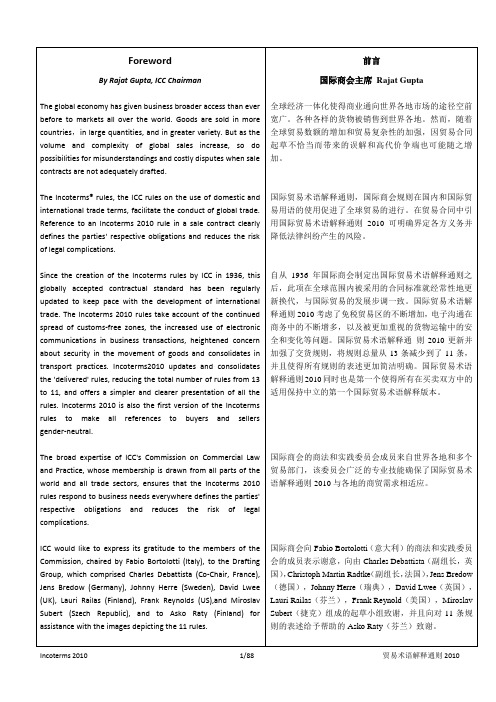
EXW (insert named place of delivery)GUIDANCE NOTEThis rule may be used irrespective of the mode of transport selected and may also be used where more than one mode of transport is employed.It is suitable for domestic trade, while FCA is usually more appropriate for international trade.“Ex Works” means that the seller delivers when it places the goods at the disposal of the buyer at the seller’s premises or a t another named place (i.e., works, factory, warehouse, etc.). The seller does not need to load the goods on any collecting vehicle, nor does it need to clear the goods for export, where such clearance is applicable.The parties are well advised to specify as clearly as possible the point within the named place of delivery, as the costs and risks to that point are for the account of the seller. The buyer bears all costs and risks involved in taking the goods from the agreed point, if any, at the named place of delivery.EXW represents the minimum obligation for the seller. The rule should be used with care as:a) The seller has no obligation to the buyer to load the goods, even though in practice the seller may be in a betterposition to do so. If the seller does load the goods, it does so at the buyer’s risk and expense. In cases where the seller i s in a better position to load the goods, FCA, which obliges the seller to do so at its own risk and expense, is usually more appropriate.b) A buyer who buys from a seller on an EXW basis for export needs to be aware that the seller has an obligation toprovide only such assistance as the buyer may require to effect that export: the seller is not bound to organize the export clearance. Buyers are therefore well advised not to use EXW if they cannot directly or indirectly obtain export clearance.c) The buyer has limited obligations to provide to the seller any information regarding the export of the goods. However,the seller may need this information for, e.g., taxation or reporting purposes.EXW——工厂交货(……指定地点)本条规则与(当事人)所选择的运输模式无关,即便(当事人)选择多种运输模式,亦可适用该规则。
Incoterms-2010-国际贸易术语中英文对照解释(全)

EXW (insert named place of delivery)GUIDANCE NOTEThis rule may be used irrespective of the mode of transport selected and may also be used where more than one mode of transport is employed.It is suitable for domestic trade, while FCA is usually more appropriate for international trade.“Ex Works” means that the seller delivers when it places the goods at the disposal of the buyer at the seller’s premises or a t another named place (i.e., works, factory, warehouse, etc.). The seller does not need to load the goods on any collecting vehicle, nor does it need to clear the goods for export, where such clearance is applicable.The parties are well advised to specify as clearly as possible the point within the named place of delivery, as the costs and risks to that point are for the account of the seller. The buyer bears all costs and risks involved in taking the goods from the agreed point, if any, at the named place of delivery.EXW represents the minimum obligation for the seller. The rule should be used with care as:a) The seller has no obligation to the buyer to load the goods, even though in practice the seller may be in a betterposition to do so. If the seller does load the goods, it does so at the buyer’s risk and expense. In cases where the seller i s in a better position to load the goods, FCA, which obliges the seller to do so at its own risk and expense, is usually more appropriate.b) A buyer who buys from a seller on an EXW basis for export needs to be aware that the seller has an obligation toprovide only such assistance as the buyer may require to effect that export: the seller is not bound to organize the export clearance. Buyers are therefore well advised not to use EXW if they cannot directly or indirectly obtain export clearance.c) The buyer has limited obligations to provide to the seller any information regarding the export of the goods. However,the seller may need this information for, e.g., taxation or reporting purposes.EXW——工厂交货(……指定地点)本条规则与(当事人)所选择的运输模式无关,即便(当事人)选择多种运输模式,亦可适用该规则。
国际贸易术语解释通则2010之FOB(中英对照版)
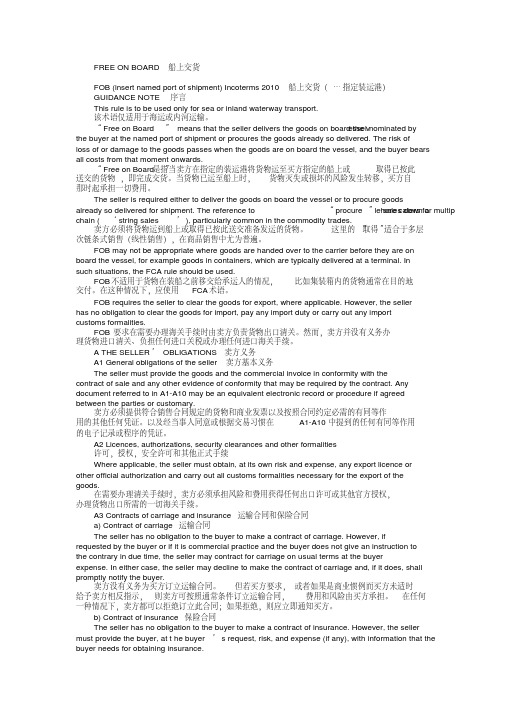
FREE ON BOARD 船上交货FOB (insert named port of shipment) Incoterms 2010 船上交货(…指定装运港)GUIDANCE NOTE 序言This rule is to be used only for sea or inland waterway transport.该术语仅适用于海运或内河运输。
essel nominated by “Free on Board” means that the seller delivers the goods on board the vthe buyer at the named port of shipment or procures the goods already so delivered. The risk ofloss of or damage to the goods passes when the goods are on board the vessel, and the buyer bearsall costs from that moment onwards.“Free on Board”是指当卖方在指定的装运港将货物运至买方指定的船上或取得已按此送交的货物,即完成交货。
当货物已运至船上时,货物灭失或损坏的风险发生转移,买方自那时起承担一切费用。
The seller is required either to deliver the goods on board the vessel or to procure goodsle sales down a already so delivered for shipment. The reference to “procure” here caters for multip chain (‘string sales’), particularly common in the commodity trades.卖方必须将货物运到船上或取得已按此送交准备发运的货物。
2010年国际贸易术语解释通则(中文完整版)
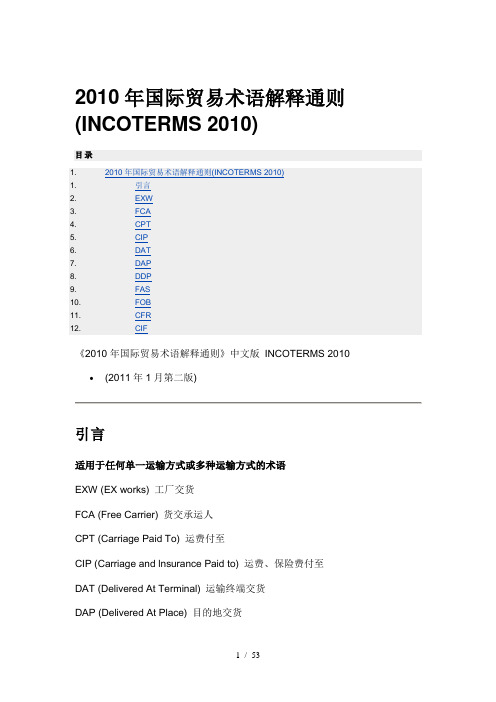
2010年国际贸易术语解释通则(INCOTERMS 2010)目录《2010年国际贸易术语解释通则》中文版INCOTERMS 2010 •(2011年1月第二版)引言适用于任何单一运输方式或多种运输方式的术语EXW (EX works) 工厂交货FCA (Free Carrier) 货交承运人CPT (Carriage Paid To) 运费付至CIP (Carriage and lnsurance Paid to) 运费、保险费付至DAT (Delivered At Terminal) 运输终端交货DAP (Delivered At Place) 目的地交货DDP (Delivered Duty Paid) 完税后交货适用于海运和内河水运的术语FAS (Free Along Side) 船边交货FOB (Free On Board) 船上交货CFR (Cost and Freight) 成本加运费CIF (Cost, Insurance and Freight) 成本、保险加运费EXW(EX Works工厂交货)该术语可适用于任何运输方式,也可适用于多种运输方式。
它适合国内贸易,而FCA一般则更适合国际贸易。
“工厂交货”是指当卖方在其所在地或其它指定地点(如工厂、车间或仓库等)将货物交由买方处置时,即完成交货。
卖方不需将货物装上任何前来接收货物的运输工具,需要清关时,卖方也无需办理出口清关手续。
特别建议双方在指定交货地范围内尽可能明确具体交货地点,因为在货物到达交货地点之前的所有费用和风险都由卖方承担。
买方则需承担自此指定交货地的约定地点(如有的话)收取货物所产生的全部费用和风险。
EXW(工厂交货)术语代表卖方最低义务,使用时需注意以下问题:a) 卖方对买方没有装货的义务,即使实际上卖方也许更方便这样做。
如果卖方装货,也是由买方承担相关风险和费用。
当卖方更方便装货物时,FCA一般更合适,因为该术语要求卖方承担装货义务,以及与此相关的风险和费用。
2010新版国际贸易术语解释通则(中英文版)

国际贸易术语解释通则(2010)目录前言. 1EXW——工厂交货(……指定地点). 5FCA——货交承运人(……指定地点). 7CPT——运费付至(……指定目的港). 10CIP——运费和保险费付至(……指定目的地)13DAT——终点站交货(……指定目的港或目的地)16DAP——目的地交货(……指定目的地). 18DDP——完税后交货(……指定目的地). 20FAS——船边交货(……指定装运港). 22FOB——船上交货(……指定装运港). 24CFR——成本加运费付至(……指定目的港)27CIF——成本,保险加运费付至(……指定目的港)30国际贸易术语解释通则2010全球化经济赋予商业以空前宽广途径通往世界各地市场。
货物得以在更多的国家、大量且种类愈繁地销售。
然而随着全球贸易数额的增加与贸易复杂性的提升,因销售合同不恰当起草引致误解与高代价争端可能性也提高了。
国际贸易术语解释通则这一用于国内与国际贸易事项的国际商会规则使得全球贸易行为更便捷。
在销售合同中参引国际贸易术语解释通则2010可清晰界定各方义务并降低法律纠纷的风险。
自1936年国际商会创制国际贸易术语以来,这项在全球范围内普遍被接受的合同标准经常更新,以保持与国际贸易发展步调一致。
国际贸易术语解释通则2010版考虑到了全球范围内免税区的扩展,商业交往中电子通讯运用的增多,货物运输中安保问题关注度的提高以及运输实践中的许多变化。
国际贸易术语解释通则2010更新并加强了―交货规则‖——规则的总数从13降到11,并为每一规则提供了更为简洁和清晰的解释。
国际贸易术语解释通则2010同时也是第一部使得所有解释对买方与卖方呈现中立的贸易解释版本。
国际商会商法和实践委员会成员来自世界各地和所有贸易领域,该委员会宽泛的专业技能确保了国际贸易术语解释通则2010与各地的商贸需要照应。
国际商会向Fabio Bortolotti(意大利)的商法和实践委员会的成员表示谢意,向由Charles Debattista(副组长,英国),Christoph Martin Radtke (副组长,法国),Jens Bredow (德国),Johnny Herre (瑞典),David Lwee(英国),Lauri Railas (芬兰),Frank Reynold(美国),Miroslav Subert (捷克)组成的起草小组致谢,并且向对11条规则的表述给予帮助的Asko Raty (芬兰)致谢。
2010年国际贸易术语解释通则(中文完整版)

2010年国际贸易术语解释通则(INCOTERMS 2010)目录1. 2010年国际贸易术语解释通则(INCOTERMS 2010)1. 引言2. EXW3. FCA4. CPT5. CIP6. DAT7. DAP8. DDP9. FAS10. FOB11. CFR12. CIF《2010年国际贸易术语解释通则》中文版INCOTERMS 2010(2011年1月第二版)引言适用于任何单一运输方式或多种运输方式的术语EXW (EX works) 工厂交货FCA (Free Carrier) 货交承运人CPT (Carriage Paid To) 运费付至CIP (Carriage and lnsurance Paid to) 运费、保险费付至DAT (Delivered At Terminal) 运输终端交货DAP (Delivered At Place) 目的地交货DDP (Delivered Duty Paid) 完税后交货适用于海运和内河水运的术语FAS (Free Along Side) 船边交货FOB (Free On Board) 船上交货CFR (Cost and Freight) 成本加运费CIF (Cost, Insurance and Freight) 成本、保险加运费EXW(EX Works工厂交货)该术语可适用于任何运输方式,也可适用于多种运输方式。
它适合国内贸易,而FCA一般则更适合国际贸易。
“工厂交货”是指当卖方在其所在地或其它指定地点(如工厂、车间或仓库等)将货物交由买方处置时,即完成交货。
卖方不需将货物装上任何前来接收货物的运输工具,需要清关时,卖方也无需办理出口清关手续。
特别建议双方在指定交货地范围内尽可能明确具体交货地点,因为在货物到达交货地点之前的所有费用和风险都由卖方承担。
买方则需承担自此指定交货地的约定地点(如有的话)收取货物所产生的全部费用和风险。
EXW(工厂交货)术语代表卖方最低义务,使用时需注意以下问题:a) 卖方对买方没有装货的义务,即使实际上卖方也许更方便这样做。
2010年国际贸易术语解释通则(中文完整版)

2010年国际贸易术语解释通则(INCOTERMS 2010)目录《2010年国际贸易术语解释通则》中文版INCOTERMS 2010 •(2011年1月第二版)引言适用于任何单一运输方式或多种运输方式的术语EXW (EX works)工厂交货FCA (Free Carrier) 货交承运人CPT (Carriage Paid To)运费付至CIP (Carriage and lnsurance Paid to)运费、保险费付至DAT (Delivered At Terminal) 运输终端交货DAP (Delivered At Place) 目的地交货DDP (Delivered Duty Paid)完税后交货适用于海运和内河水运的术语FAS (Free Along Side) 船边交货FOB (Free On Board)船上交货CFR (Cost and Freight) 成本加运费CIF (Cost, Insurance and Freight) 成本、保险加运费EXW(EX Works工厂交货)该术语可适用于任何运输方式,也可适用于多种运输方式。
它适合国内贸易,而FCA一般则更适合国际贸易。
“工厂交货"是指当卖方在其所在地或其它指定地点(如工厂、车间或仓库等)将货物交由买方处置时,即完成交货.卖方不需将货物装上任何前来接收货物的运输工具,需要清关时,卖方也无需办理出口清关手续。
特别建议双方在指定交货地范围内尽可能明确具体交货地点,因为在货物到达交货地点之前的所有费用和风险都由卖方承担。
买方则需承担自此指定交货地的约定地点(如有的话)收取货物所产生的全部费用和风险。
EXW(工厂交货)术语代表卖方最低义务,使用时需注意以下问题:a)卖方对买方没有装货的义务,即使实际上卖方也许更方便这样做.如果卖方装货,也是由买方承担相关风险和费用。
当卖方更方便装货物时,FCA一般更合适,因为该术语要求卖方承担装货义务,以及与此相关的风险和费用.b) 以EXW为基础购买出口产品的买方需要注意,卖方只有在买方要求时,才有义务协助办理出口,即卖方无义务安排出口通关。
国际贸易术语解释通则2010之CPT(中英对照版)
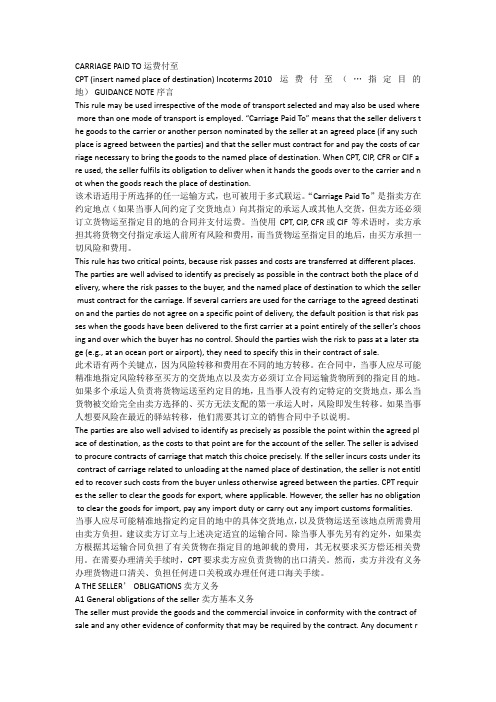
CARRIAGE PAID TO 运费付至CPT (insert named place of destination) Incoterms 2010 运费付至(…指定目的地) GUIDANCE NOTE 序言This rule may be used irrespective of the mode of transport selected and may also be used where more than one mode of transport is employed. “Carri age Paid To” means that the seller delivers t he goods to the carrier or another person nominated by the seller at an agreed place (if any such place is agreed between the parties) and that the seller must contract for and pay the costs of car riage necessary to bring the goods to the named place of destination. When CPT, CIP, CFR or CIF a re used, the seller fulfils its obligation to deliver when it hands the goods over to the carrier and n ot when the goods reach the place of destination.该术语适用于所选择的任一运输方式,也可被用于多式联运。
“Carriage Paid To”是指卖方在约定地点(如果当事人间约定了交货地点)向其指定的承运人或其他人交货,但卖方还必须订立货物运至指定目的地的合同并支付运费。
Incoterms-2010-国际贸易术语中英文对照解释(全)

ForewordBy Rajat Gupta, ICC ChairmanThe global economy has given business broader access than ever before to markets all over the world. Goods are sold in more countries ,in large quantities, and in greater variety. But as the volume and complexity of global sales increase, so do possibilities for misunderstandings and costly disputes when sale contracts are not adequately drafted.The Incoterms? rules, the ICC rules on the use of domestic and international trade terms, facilitate the conduct of global trade. Reference to an Incoterms 2010 rule in a sale contract clearly defines the parties' respective obligations and reduces the risk of legal complications.Since the creation of the Incoterms rules by ICC in 1936, this globally accepted contractual standard has been regularly updated to keep pace with the development of international trade. The Incoterms 2010 rules take account of the continued spread of customs-free zones, the increased use of electronic communications in business transactions, heightened concern about security in the movement of goods and consolidates in transport practices. Incoterms2010 updates and consolidates the 'delivered' rules, reducing the total number of rules from 13 to 11, and offers a simpler and clearer presentation of all the rules. Incoterms 2010 is also the first version of the Incoterms rules to make all references to buyers and sellers gender-neutral.The broad expertise of ICC's Commission on Commercial Law and Practice, whose membership is drawn from all parts of the world and all trade sectors, ensures that the Incoterms 2010 rules respond to business needs everywhere defines the parties' respective obligations and reduces the risk of legal complications.ICC would like to express its gratitude to the members of the Commission, chaired by Fabio Bortolotti (Italy), to the Drafting Group, which comprised Charles Debattista (Co-Chair, France), Jens Bredow (Germany), Johnny Herre (Sweden), David Lwee (UK), Lauri Railas (Finland), Frank Reynolds (US),and Miroslav Subert (Szech Republic), and to Asko Raty (Finland) for assistance with the images depicting the 11 rules.前言国际商会主席Rajat Gupta全球经济一体化使得商业通向世界各地市场的途径空前宽广。
国际贸易术语解释通则2010之FCA(中英对照版)

Free Carrier 货交承运人FCA (insert named place of delivery) Incoterms 2010 货交承运人(…指定地点) GUIDANCE NOTE序言This rule may be used irrespective of the mode of transport selected and may also be used where mor e than one mode of transport is employed. “Free Carrier” means that the seller delivers the goods t o the carrier or another person nominated by the buyer at the seller’s premises or another named pl ace. The parties are well advised to specify as clearly as possible the point within the named place of d elivery, as the risk passes to the buyer at that point. If the parties intend to deliver the goods at the sell er’s premises, they should identify the address of those premises as the named place of delivery. If, on the other hand, the parties intend the goods to be delivered at another place, they must identify a d ifferent specific place of delivery. FCA requires the seller to clear the goods for export, where applica ble.However, the seller has no obligation to clear the goods for import, pay any import duty or carry out any import customs formalities.该术语适用于所选择的任一运输方式,也可被用于多式联运。
2010年国际贸易术语解释通则(中文完整版)
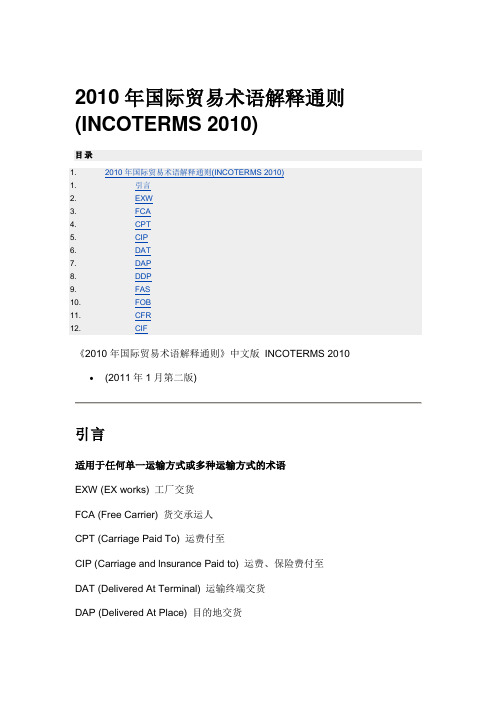
2010年国际贸易术语解释通则(INCOTERMS 2010)目录《2010年国际贸易术语解释通则》中文版INCOTERMS 2010 •(2011年1月第二版)引言适用于任何单一运输方式或多种运输方式的术语EXW (EX works) 工厂交货FCA (Free Carrier) 货交承运人CPT (Carriage Paid To) 运费付至CIP (Carriage and lnsurance Paid to) 运费、保险费付至DAT (Delivered At Terminal) 运输终端交货DAP (Delivered At Place) 目的地交货DDP (Delivered Duty Paid) 完税后交货适用于海运和内河水运的术语FAS (Free Along Side) 船边交货FOB (Free On Board) 船上交货CFR (Cost and Freight) 成本加运费CIF (Cost, Insurance and Freight) 成本、保险加运费EXW(EX Works工厂交货)该术语可适用于任何运输方式,也可适用于多种运输方式。
它适合国内贸易,而FCA一般则更适合国际贸易。
“工厂交货”是指当卖方在其所在地或其它指定地点(如工厂、车间或仓库等)将货物交由买方处置时,即完成交货。
卖方不需将货物装上任何前来接收货物的运输工具,需要清关时,卖方也无需办理出口清关手续。
特别建议双方在指定交货地范围内尽可能明确具体交货地点,因为在货物到达交货地点之前的所有费用和风险都由卖方承担。
买方则需承担自此指定交货地的约定地点(如有的话)收取货物所产生的全部费用和风险。
EXW(工厂交货)术语代表卖方最低义务,使用时需注意以下问题:a) 卖方对买方没有装货的义务,即使实际上卖方也许更方便这样做。
如果卖方装货,也是由买方承担相关风险和费用。
当卖方更方便装货物时,FCA一般更合适,因为该术语要求卖方承担装货义务,以及与此相关的风险和费用。
Incoterms-2010-国际贸易术语中英文对照解释(全)

EXW (insert named place of delivery)GUIDANCE NOTEThis rule may be used irrespective of the mode of transport selected and may also be used where more than one mode of transport is employed.It is suitable for domestic trade, while FCA is usually more appropriate for international trade.“Ex Works” means that the seller delivers when it places the goods at the disposal of the buyer at the seller’s premises or at another named place (i.e., works, factory, warehouse, etc.). The seller does not need to load the goods on any collecting vehicle, nor does it need to clear the goods for export, where such clearance is applicable.The parties are well advised to specify as clearly as possible the point within the named place of delivery, as the costs and risks to that point are for the account of the seller. The buyer bears all costs and risks involved in taking the goods from the agreed point, if any, at the named place of delivery.EXW represents the minimum obligation for the seller. The rule should be used with care as:a) The seller has no obligation to the buyer to load the goods, even though in practice the seller may be in a betterposition to do so. If the seller does load the goods, it does so at the buyer’s risk and expense. In cases where the seller i s in a better position to load the goods, FCA, which obliges the seller to do so at its own risk and expense, is usually more appropriate.b) A buyer who buys from a seller on an EXW basis for export needs to be aware that the seller has an obligation toprovide only such assistance as the buyer may require to effect that export: the seller is not bound to organize the export clearance. Buyers are therefore well advised not to use EXW if they cannot directly or indirectly obtain export clearance.c) The buyer has limited obligations to provide to the seller any information regarding the export of the goods. However,the seller may need this information for, e.g., taxation or reporting purposes.EXW——工厂交货(……指定地点)本条规则与(当事人)所选择的运输模式无关,即便(当事人)选择多种运输模式,亦可适用该规则。
- 1、下载文档前请自行甄别文档内容的完整性,平台不提供额外的编辑、内容补充、找答案等附加服务。
- 2、"仅部分预览"的文档,不可在线预览部分如存在完整性等问题,可反馈申请退款(可完整预览的文档不适用该条件!)。
- 3、如文档侵犯您的权益,请联系客服反馈,我们会尽快为您处理(人工客服工作时间:9:00-18:30)。
国际贸易术语解释通则2010前言(中英对照版)ForewordBy Rajat Gupta,ICC CbairmanThe global economy has given businessbroader access than ever before to markets all over the world. Goods are soldin more countries,in large quantities, and in greater variety. But as the volume andcomplexity of global sales increase, so do possibilities for misunderstandingsand costly disputes when sale contracts are not adequately drafted.The Incoterms® rules, the ICC rules on theuse of domestic and international trade terms, facilitate the conduct of globaltrade. Reference to an Icoterms 2010 rule in a sale contract clearlydefines the parties' respective obligationsand reduces the risk of legal complications.Since the creation of the Incoterms rulesby ICC in 1936, this globally accepted c ontractual standard has been regularlyupdated to keep pace with the development of international trade. The Incoterms2010 rules take account of the continued spread of customs-free zones, the increaseduse of electronic communications in business transactions, heightened concernabout security in the movement of goods and consolidates in transportpractices. Incoterms2010 updates and consolidates the 'delivered' rules,reducing the total number of rules from 13to 11, and offers a simpler and clearer presentation of all the rules.Incoterms 2010 is also the first version of the Incoterms rules to make allreferences to buyers and sellers gender-neutral.The broad expertise of ICC's Commission onCommercial Law and Practice, whose membership is drawn from all parts of theworld and all trade sectors, ensures that the Incoterms 2010 rules respond tobusiness needs everywhere.前言国际商会主席Rajat Gupta全球经济一体化让生意的接触面比以往任何时候都宽广,可以触及世界每个角落。
更多品种的货物可供选择、卖向更多国家、卖得也越来越多。
然而,随着全球贸易数额的增加和贸易复杂性的加强,因贸易合同起草不恰当而带来的误解和高代价争端也可能随之增加。
国际贸易术语解释通则,国际商会规则在国内和国际贸易用语的使用促进了全球贸易的进行。
在贸易合同中引用国际贸易术语解释通则2010可明确界定各方义务并降低法律纠纷产生的风险。
自从1936年国际商会制定出国际贸易术语解释通则之后,此项在全球范围内被采用的合同标准就经常性地更新换代,与国际贸易的发展步调一致。
国际贸易术语解释通则2010考虑了免税贸易区的不断增加,电子沟通在商务中的不断增多,以及被更加重视的货物运输中的安全和变化等问题。
国际贸易术语解释通则2010更新并加强了交货规则,将规则总量从13条减少到了11条,并且使得所有规则的表述更加简洁明确。
国际贸易术语解释通则2010同时也是第一个使得所有在买卖双方中的适用保持中立的第一个国际贸易术语解释版本。
国际商会的商法和实践委员会成员来自世界各地和多个贸易部门,该委员会广泛的专业技能确保了国际贸易术语解释通则2010与各地的商贸需求相适应。
ICC would like to express its gratitude tothe members of the Commission, chaired by Fabio Bortolotti (Italy), to theDrafting Group, which comprised Charles Debattista(Co-Chair, France), Jens Bredow(Germany), Johnny Herre(Sweden), David Lwee(UK), Lauri Railas(Finland),FrankReynolds(US),and Miroslav Subert(Szech Republic), and to Asko Raty (Finland)for assistance with the images depicting the 11 rules.国际商会向Fabio Bortolotti(意大利)的商法和实践委员会的成员表示谢意,向由Charles Debattista(副组长,英国),Christoph Martin Radtke (副组长,法国),Jens Bredow (德国),JohnnyHerre (瑞典),David Lwee(英国),Lauri Railas (芬兰),Frank Reynold(美国),Miroslav Subert (捷克)组成的起草小组致谢,并且向对11条规则的表述给予帮助的Asko Raty (芬兰)致谢。
INTRODUCTIONThe Incoterms® rules explain a set ofthree-letter trade terms reflecting business-to-business practice in contractsfor the sale of goods. The Incoterms® rules describe mainly the tasks, costsand risks involved in the delivery of goods from sellers to buyers.How to use the Incoterms® 2010 rules1. Incorporate the Incoterms® 2010 rulesinto your contract of saleIf you want the Incoterms® 2010 rules toapply to your contract, you should make this clear in the contract, throughsuch words as, “[the chosen Incoterms rule including the named place ,followedby] Incoterms® 2010”.2. Choose the appropriate Incoterms ruleThe chosen Incoterms rule needs to beappropriate to the goods, to the means of their transport, and above all towhether the parties intend to put additional obligations,介绍Incoterms®规则对一系列三个字母组成的贸易术语进行了解释,这些贸易术语对B2B的货物销售合同有着实际影响。
Incoterms®规则主要描述了货物从卖方到买方运输过程中涉及的责任,费用和风险的划分。
如何适用Incoterms®2010规则1.在销售合同中明示应用Incoterms®2010规则(哎,原来的翻译啊,无语)如果要使合同适用Incoterms规则2010,应在合同中明确表明,例如:所选择的Incoterms 规则(含指定地点)适用Incoterms®规则2010。
2.选择最契合的Incoterms规则所选的Incoterms规需要契合实际,主要考虑因素有三点,1、货物,2、运输方式、3,买卖方是否要加入其它责任条款,例如将办理运输或保险的义务加于买方或卖方。
for example such as the obligation toorganize carriage or insurance, on the seller or on the buyer. The GuidanceNote to each Incoterms rule contains information that is particularly helpfulwhen making this choice. Whichever Incoterms rule is chosen, the parties shouldbe aware the interpretation of their contract may well be influenced by customsparticular to the port or place being used.3. Specify your place or port as preciselyas possibleThe chosen Incoterms rule can work only ifthe parties name a place or port, and will work best if the parties specify theplace or port as precisely as possible.A good example of such precision would be::“FCA 38 Cours Albert 1er, Paris, FranceIncoterms 2010”.Under the Incoterms rule Ex Works(EXW),Free Carrier(FCA), Delivered at Terminal(DA T), Delivered at Place(DAP),Delivered Duty Paid(DDP),每项通则条款的解释性说明,都对做出恰当的选择极有帮助。
